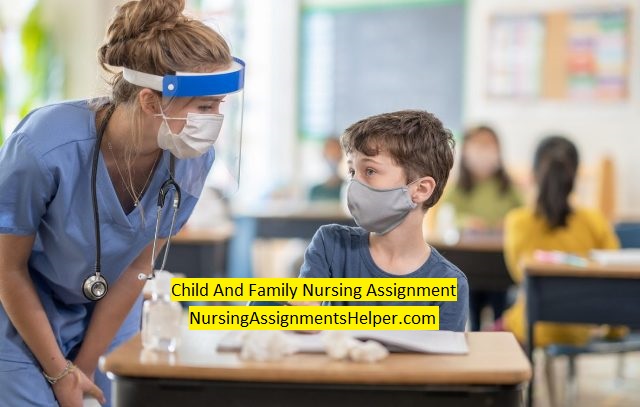2810NRS Child And Family Nursing Task
2810NRS Child And Family Nursing Practice Assignment
Word count : 1,500 words
Weighting : 40 %
Aim:
The aim of this written assessment item is to apply the nursing process in providing family centred care. When individuals experience a health or social issue, the issue can impact upon all members of the family. Nurses working in acute care and community settings need to understand the functioning of the family unit so they can care for and assist the whole family.
2810NRS Child And Family Nursing Task
This written assignment addresses course learning outcomes 2 and 3:
2) Demonstrate an understanding of the functioning of the family unit using family
assessment models that enable families to make health decisions;
3) Plan and evaluate evidence-based nursing for families across the lifespan
2810NRS Child And Family Nursing Task

Instructions & Assignment Structure:
- Read the attached case study
- From the ‘Recommendations’ section of the case study select two (2)
issues/challenges for the family or a member of the family. - Each issue/challenge identified must be described and discussed using the nursing process (allow approximately 650 words per issue):
- You may use the subheadings in your assignment to separate your discussions.
Describe the issue – Use appropriate evidence from scholarly literature to describe the issue and discuss
Plan nursing care : Provide a relevant nursing goal and justify the goal (explain why it is relevant to the issue) using appropriate evidence or policies.
Implement nursing care : Outline one (1) nursing intervention that supports the family to achieve the goal. Each nursing intervention should be supplemented by the recommendation of an existing online resource for the family and an appropriate referral.
Evaluate nursing care : Describe how you would evaluate the effectiveness of the intervention to address whether it met the planned goal of care (specifically explain how the intervention can be evaluated/judged by the nurse).
2810NRS Child And Family Nursing Task
Other Elements :
* Do not include a Griffith University cover page at the start of your assignment. You
will agree to the assignment submission statements when you submit electronically.
* Refer to the XXX Health Writing and Referencing Guide for guidance on writing,
and referencing according to APA 7th style and presentation.
* Ensure that you use at least 10 different sources of relevant scholarly literature1
(digitised readings, research articles, relevant Government reports and textbooks)
that has been published within the last seven (7) years. If you use literature older
than 7 years, you will need to justify why you are not using recent literature. Please
note it is preferable to locate and use Australian sources if you are describing the
extent or magnitude of the issue.
* Use academic language2 throughout and write in the third person.
1 Some papers are of central importance to a research topic, often because they report a major breakthrough, insight, or a new and generative synthesis of ideas. This kind of paper may describe a study that changes our understanding of a topic or describes and illustrates a new and highly useful research method. These kinds of
articles are often referred to as seminal or classic papers.
2 Everyday language is predominantly subjective. It is mainly used to express opinions based on personal preference or belief rather than evidence. Written academic English is formal. It avoids colloquialisms and slang, which may be subject to local and social variations. Formal language is more precise and stable, and
therefore more suitable for the expression of complex ideas and the development of reasoned arguments.
- Refer to the marking criteria when writing your assignment. This will assist you in calculating the weightings of the sections for your assignment.
- State your word count (excluding your reference list) on your assignment title page. Word limits for assessment items need to be strictly adhered to. The word limit for an assessment includes in text citations, tables, and quotations. The word limit DOES NOT include the reference list. Please note the marker will cease marking your
- Maintain academic integrity.
- Submit your assignment as a word document (not a PDF).
- Submit a draft assignment via Turnitin and check your Turnitin report (allow up to 24 hours for report generation). If you need more information about Turnitin, make use of the online resources. use of the online resources.
- Submit your final assignment via Turnitin as per the instructions on the 2810NRS XXX course site [Submit in the ‘Assessment’ tab].
- Keep your Turnitin receipt as a record of successful submission (an on-screen receipt will be displayed after submission which you should take a screen shot of).

2810NRS Child And Family Nursing Task
Case Study
Situation
Cooper Merino is a 5-year-old boy who has been admitted to the emergency department with exacerbation of his asthma. This is his third admission in the last six months for the same issue. Aside from his asthma, Cooper does not have any other medical history and is otherwise well. His mother Renee has brought Cooper in each time and is reluctant to leave him alone.
Background
Renee [31yrs] and David [33yrs] live in Pimpama, and they have two children: Cooper, and Ella his 3-year- old sister. David is a FIFO (fly in fly out) worker who is currently working in Paraburdoo, Western Australia, and can be away for 6 weeks at a time. Betty and Tom, Renee’s parents who have retired, recently moved
to Brisbane from Cairns so that they can be closer to the family and help when needed. When Cooper is in hospital Ella stays with the grandparents if David is at work; however, they live too far away to drive her to day care so she stays at home with them. Although David likes Betty and Tom, he does not like leaving the
children with them, as he feels they are “too old to keep on top of the kids”, and often remarks that they do not discipline the kids appropriately.
2810NRS Child And Family Nursing Task
Assessment
While reviewing Cooper taking his medication you note that Renee is administering it without a spacer, and you are therefore unsure of what dose Cooper is receiving. Renee states that she has tried to use the spacer, but Cooper does not like it and does not want to make him upset in case that makes his asthma worse.
You are also aware that Cooper is withdrawn with you and other health professionals and is often found to be loud, defiant, and ‘playing rough’ with his mother. This is often associated with Renee asking Cooper to do some schoolwork such as reading. Again, Renee is keen not to upset Cooper and therefore does not ‘push’ him if he does not want to do something. Renee has previously commented that Cooper is normally very quiet and calm at home but is likely just very bored at being in hospital, which she feels is also the reason that he has again started to wet his bed at night.
The grandparents have also come to visit Cooper and have brought Ella along. They do not visit the hospital often as they find it is difficult to navigate the roads and afford the cost of parking. Although they love seeing Cooper, these challenges mean they have few visits. Renee is very happy to see Ella, however, Ella appears very shy and reluctant to go to her mother, wanting to cuddle her grandmother.
2810NRS Child And Family Nursing Task
Recommendations
Mother’s reluctance to leave Cooper (possible guilt).
Change in Cooper when in hospital and reaction to mother.
Mother not wanting to upset Cooper.
Lack of support in nuclear household due to David being FIFO worker and away for several weeks at a time.
Grandparents helping but not able to complete role in full (day-care & discipline).
Ella missing out on ‘normal’ routine when Cooper admitted to hospital.
Possible issues between David and grandparents regarding caring for children.
Financial impact to grandparents when caring for children and when Cooper in hospital.
Renee may possibly lack understanding regarding asthma condition.
Issues regarding medication administration.
Regression to bed wetting by Cooper.
Ella possibly withdrawing from mother when left with grandparents.
Missing early education and schoolwork.